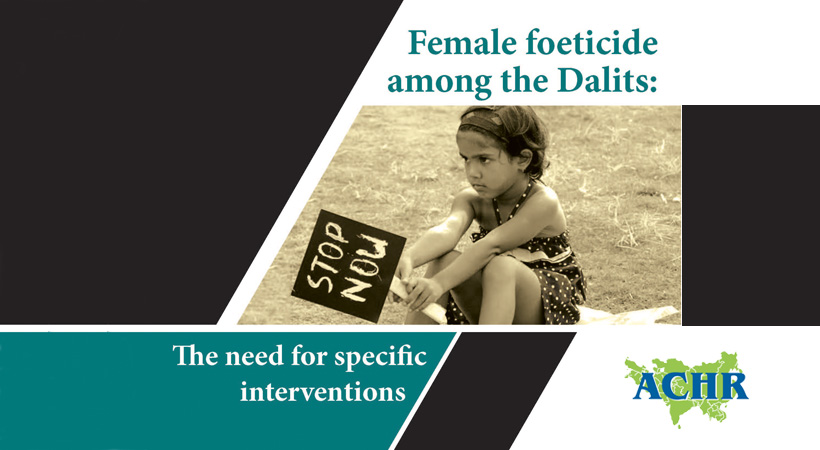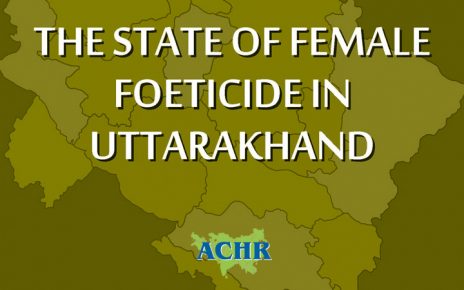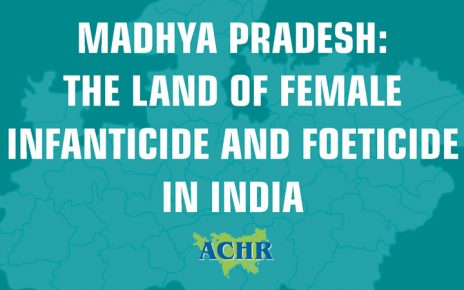India is infamous for female foeticide. It has been witnessing consistent fall in the child sex ratio (CSR): from 976 in 1961 to 964 in 1971 to 962 in 1981 to 945 in 1991 to 927 in 2001 and 919 in 2011. Before the invention of technology for sex determination, India’s CSR was 976 in 1961, 964 in 1971 and 962 in 1981. The highest fall in the CSR from 1981 to 1991 (17 points) and 1991 to 2001 (18 points) confirm beyond any reasonable doubt the misuse of technology for sex selection.
The CSR among the Scheduled Castes (SCs) has declined by 5 points from 938 girls per 1000 boys in 2001 to 933 in 2011. Though the CSR decline among the SCs at national level is not as alarming, the CSR in certain pockets have deteriorated significantly.
There are 12 States which have the lowest CSR in the country. These are Punjab, Himachal Pradesh, Uttar Pradesh, Haryana, Chandigarh, Uttarakhand, Rajasthan, NCT of Delhi, Madhya Pradesh, Maharashtra, Jammu & Kashmir and Gujarat. These 12 States and UTs have a total of 313 districts.
The CSR of the SCs in 266 (85%) out of the 313 districts in these 12 States/ UTs is below the normal or desirable CSR of 950 or more. Further, in 244 (78%) out of the 313 districts, the CSR of the SCs was below the national level CSR of the SCs (933) as per 2011 census. Worse, the CSR of the SCs in 104 districts recorded below 900. There are 50 districts which recorded CSR among SC population less than that of their respective district CSR.
This clearly indicates that the schemes for retention of girl child have failed to touch the SCs in many districts. The gaps and problems identified by the Planning Commission in implementation of the Scheduled Castes Sub Plan (SCSP) are instructive. The Beti Bachao Beti Padao (BBBP) scheme which does not have any specific component to target the SCs is unlikely to reach out to the SCs.
Further, there are serious flaws in the implementation of BBBP Scheme. As per the BBBP guidelines, one of the key components of BBBP is the effective implementation of the PC&PNDT Act at the national, state and district level. The best practices cited by the Ministry ofWomen and Child Development show that there is no case to be cited as best practices of the PC&PNDT Act which clearly indicates that nothing has been done to implement the PC&PNDT Act under the BBBP. Further, the funds allocated also remained largely unutilized. The States that could not unutilise funds released during 2014-2015 includes Haryana (Rs. 36.89 lakh out of Rs. 2,23,00,000); Himachal Pradesh (entire Rs. 36,34,00); Maharashtra (entire Rs 1,58,73,000); Punjab (Rs. 250.97 lakh), Uttarakhand (Rs. 21,15,000); Uttar Pradesh(Rs. 187.98 lakh); and Chandigarh (Rs. 4,71,500 out of Rs. 32,50,500).
Asian Centre for Human Rights therefore recommends the following to the Ministry of Women and Child Development and the Ministry of Social Justice:
- Launch a separate scheme to address fall of the CSR among the Scheduled Castes;
- Ensure that in the implementation of all the Schemes, percentage of funds are allocated for the Scheduled Castes proportionate to their population in the State;
- Ensure that Beti Bachao Beti Padao scheme undertake specific activities to cover the Scheduled Castes inhabited areas.




